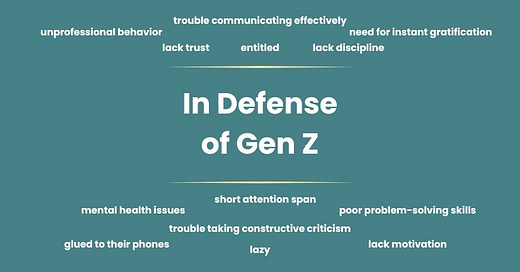In Defense of Gen Z
Gen Z has a reputation for being challenging to work with and difficult to manage.
Recent news articles underscore the challenges of bridging generational gaps. Coaches, employers, Gen Z athletes, and employees can benefit from open communication, adaptability, and mutual understanding.
In the Read/Watch/Listen/Think format below you will discover some useful insights and tips for interacting with Gen Z.
READ
“Unprepared and Unprofessional”: Some Context in Defense of Gen Z
Next week will be the six-year anniversary of a question that changed the trajectory of my work.
“Betsy, do you have anything on coaching kids these days? Because I feel like they’re a little bit different.”
In February of 2019 I didn’t yet have anything to offer on Gen Z, but later that year and every year since I’ve immersed myself in ongoing work to help coaches better communicate, connect with, and coach Gen Z. I’ve also created two online courses for coaching Gen Z athletes, Relating to Today's Student-Athlete: Effectively Coaching Gen Z, and GEN Z - Updates From the Field: Effectively Coaching Gen Z in an Optimal Sport Experience.
In classrooms and conference rooms, on stages, and in side conversations I’ve asked thousands of people to finish the phrase, “Kids these days” with whatever has been true in their experience. The most frequent responses I hear include, lazy, unmotivated, soft, lack resilience, don’t know how to work hard, need instant gratification, want to know why, can’t get off their phones, don’t know how to have face-to-face conversations… the list is long and many people cite more problems then they do positives when it comes to characterizing the generation born between 1997 - 2012.
Last month Forbes ran two articles about Gen Z in the workforce citing how bosses are firing recent grads months after hiring them, and that managers say Gen Z is the hardest to work with.
One of the articles was kind enough to offer the Pandemic as a reason that Gen Z missed out on internships and is thus unprepared for the professional realm, but the reality is more nuanced and requires greater context.
Gen Z has never known life without the Internet. As an “Elder Millenial” born in 1983, I can remember a world where information was only at our fingertips if we found the right book on a library shelf after using the Dewey Decimal System to locate it. The changes in technology over my 41 years have been incredible, and when we start to understand how technology shaped the world Gen Z grew up in we can begin to comprehend why many Gen Zers are showing up “unprepared and unprofessional” in the workforce.
To those who criticize, allow me to offer this perspective,
It’s not impossible, it’s simply unpracticed.
Because of technology, Gen Z has not had the same opportunities to practice certain skills (like face-to-face communication) that were more innate for previous generations.
Because technology has created greater ease, Gen Z has begun to associate “hard” with “bad”.
As coaches, parents, educators, and employers we have an opportunity to help Gen Z upskill in ways we know they will need for the professional world.
For example, if you’re working with college-age student-athletes invite them to write a letter of recommendation as if they were a member of your coaching staff. What is it you want us to say about you to a future employer by the time you leave our program? In doing this exercise they are broadening their perspective and putting in writing who they aspire to be. Additionally, you can take that letter out at any time and use it as a starting point for conversations around behavior and accountability.
“When you wrote this letter it sounded very important that you were seen as a great teammate, yet what I’ve observed recently tells a different story. Help me understand what’s changed for you”.
If you get an email from Gen Z that you feel is “unprofessional” (and I’ve received many over the years) are you helping that person start to understand why that communication may not land well with someone who doesn’t know them like you do?
The opportunities for older generations to teach skills that support the professional success of Gen Z are limited only by our judgment and energy to engage.
It’s not impossible, it’s simply unpracticed. Let’s help them get some reps in.
WATCH
Motivational Interviewing is one of the more effective ways to work with Gen Z, and in this webinar, Dr. Ben Freakley provides coaches with tools and techniques on how to use Motivational Interviewing to motivate athletes, improve their performance, and enhance their overall well being.
LISTEN
In this episode, Dr. Nick Holton, a consultant and coach specializing in optimizing performance and well-being, tackles the perception that "kids these days are soft" and encourages a shift from complaining about fragility to fostering anti-fragility in young individuals. Dr. Holton shares insights from his extensive experience with NBA athletes, NCAA programs, and Fortune 500 companies, emphasizing the importance of creating supportive and challenging environments.
THINK
"While no single conversation is guaranteed to change the trajectory of a career or a company or a relationship or a life, any single conversation can."
– Susan Scott
With Gratitude,
:) Betsy





